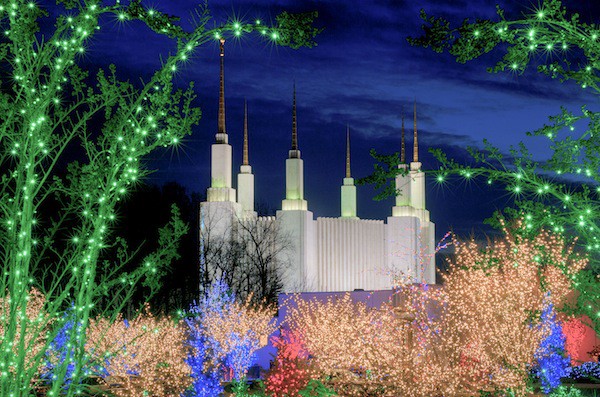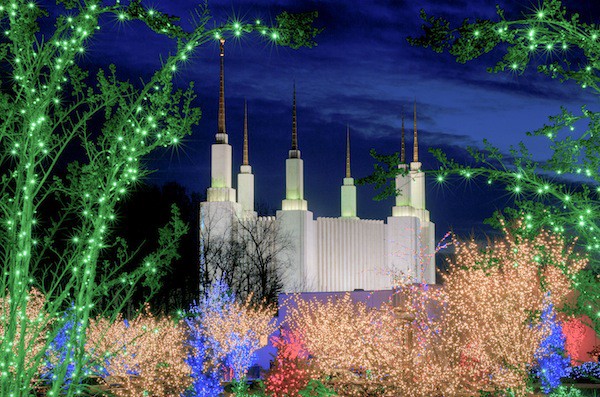Interview With a Feminist Mormon
by Lucy Madison


Natalie is a 23-year-old feminist Mormon who lives in Boise, Idaho.
Let’s talk a little about your upbringing. Where did you grow up, and what was your community like?
I grew up in Boise, Idaho. Boise is unique in that it has a large Mormon community but it’s not a Mormon town. So, at my high school there were 2,000 kids and around 500 of them were Mormon.
Did you know any women growing up who were feminists?
Publicly? No, I don’t remember any of my young women leaders saying that they were feminists. I’ve had some young women leaders who were kind of tomboys, but in their lessons they always toed the party line. My sister and my mom are very conservative, but they’re very strong, outspoken women. So while they don’t consider themselves feminists, they kind of embody those ideals. Feminism is just an F-word we’re not supposed to embrace.
It sounds strange, but Titanic came out when I was eight and of course I rented it on the sly, because I wanted to know what everyone was freaking out about. Kate Winslet played this ballsy, opinionated woman who was also very feminine, and who liked being feminine. I feel like that character was my outside feminist role model, strange as it may seem. [laughs] It always kind of broke my heart when people hated on that movie.
I love that you rented Titanic on the sly. So at what point did you start to question your faith?
My faith crisis started when I was 14 or 15. I was trying really hard to be the true blue Mormon, and I didn’t want to talk about these other feelings I was having. It was my problem, you know?
What were some of the issues you were dealing with?
I went to my bishop to talk about masturbation when I was 16. At our first couple of meetings, I didn’t even drop the word masturbation. I think during the third or fourth meeting the bishop was like, “Just to clarify, we’re talking about masturbation, right?” [laughs] Because I was so ashamed. I felt really bad for being 16 and for having these thoughts. I was just reading Jane Austen fan fiction and stuff! And — I die of shame — I was into these steamy romance novels. I felt like I finally understood sex. I had learned about sex before, but until I read my first romance novel, at my [non-Mormon] great aunt’s house, I didn’t really understand why people bothered. [laughs] After reading that novel I was like, “Oh! I get it!”
So what did the bishop say about the whole masturbation thing?
After two years worth of meetings, he gave me the recovery manual.
The what?
The church published this Mormon version of the 12-step program manual, where it’s the 12 steps but they insert Mormon scriptures and ideas into them. I was just masturbating once or twice or three times a week, and sometimes not for months at a time. I hardly think I was an addict. So he gave me that book, and I felt like he had given up on me. Instead of saying, “I might be out of my depth, how about go to a therapist?” he basically said, “Oh you’re probably an addict.” I had invested two years with this guy! Couldn’t he have figured this out six months before? So then I went to a therapist for a year.
How did all this impact your religious beliefs?
The thing is, masturbation is a normal thing, but [the community] doesn’t talk to girls about it — I have since learned that they talk to boys about it — because we’re not supposed to desire. So I knew it was something a girl is not supposed to do, which made it even worse. So then it became kind of masochistic for me. It was like, Oh, Natalie ate too much today, she’s going to masturbate. I didn’t want to cut myself, I wasn’t ballsy enough to get drunk, I wasn’t ballsy enough to smoke — it was the biggest thing I could think to do to hurt myself within my religion. Which is really sad, that I was using my sexuality to hurt myself. So that was one of the things that I had to unpack with my therapist.
After that, I put my religion in a box for about a year. I was kind of like, I need to know who I am right now. I went to college at Boise State to study music, but eventually I figured out I wanted to be a writer. I also decided I was ready to be Mormon again. I felt, I know myself. I feel OK with myself. So I wanted to transfer to BYU — because that’s where all the good Mormons go — so when I got my rejection letter from them, I felt like it was sign from God that I wasn’t good enough. At the time I was dating this non-Mormon guy who was really great, but I thought I could still negotiate with myself and God, and that I would be able to get there — to be a good Mormon girl. So I broke up with him that night and transferred up here to BYU-Idaho, where I spent my first two semesters trying to be the good Molly Mormon.
What’s that?
It’s kind of the Mormon idea about how a woman’s supposed to act. Molly Mormons are women who are so spiritually obsessed that everything has to be by the book. Oh, your dress is not knee length! Oh no! It’s encapsulated by this sense that you have to be modest enough to be deemed attractive but not immodest enough to be deemed sexy. Being blonde and petite is sort of an added bonus. There’s a different type of body shaming that happens within Mormonism. It’s not necessarily the same as you see in Vogue or watching Sex and the City, where it’s like, “I have to be a size 4.” It’s more trying to be this modest female paradigm virtue where you’re supposed to be enticing and attractive but also sweet and naïve.
I remember this woman in our ward [growing up] who would have a baby almost every year, but she was this blonde bombshell: Beautiful, blonde hair, always styled on Sunday, size 6, and like three weeks after pregnancy she would try to squeeze back into her pencil skirts. She walked that line perfectly between modesty and sexiness.
So how’d it go, being the perfect Mormon girl?
My first semester went okay. But my second semester, I moved into a dorm with three 19-year-old girls. I was two years older than all my roommates, but I had one roommate who was getting married, so she was moving up in the Mormon hierarchy. It was this weird dynamic. So one day in the middle of the semester I had a really bad day, and I was a little bit terse with one of my roommates and her friends. After they left, my roommate just got on me. She was like, “Why aren’t you fun anymore?” She poked the bear.
There’s this idea within the community that women can’t get mad, and I broke that rule. I wasn’t allowed to voice my frustrations; I was shamed for just getting upset. I tried apologizing and it didn’t work, so for the rest of the semester when I came home, no one said hi to me. It was during that semester that I discovered [the progressive Mormon podcast] Mormon Stories, and I started getting into the alternative Mormon scene.
What’s that scene like?
The alternative Mormon scene is pretty much online for me right now. It helps me identify with my own issues and my own faith, hearing other people talk about those things. I don’t feel alone. So the internet was kind of a jumping board into feminism. It helped me figure out that I’m OK with feminism, and this is how feminism could work for our church, and then it opened things up even wider. Now I’m getting into feminist theory and getting more into women’s issues globally. I’m actually probably more involved with church because of the internet. It’s kind of like the church as I wish it could be.
Do you feel stressed about the whole marriage thing? You mentioned there’s a hierarchy among married vs. non-married people.
I remember feeling old when I turned 21. Because the boys come back from their missions when they’re 22, and guess who’s the most sexually viable girl they want? They want the 18-, 19-, 20-year-olds, because they’re still naive enough to think that the guys are the shit, and they’re still young enough to not value independence. Now that I’m 23, most of the hot and horny returned missionaries have already married. And then there’s this little Mormon colloquialism that a single man older than 27 is a “menace to society.” The culture vilifies older single men, so when 23-year-old women are trying to date, you know, 28-year-old Mormon men, there’s this idea that, well, if he were really attractive, why didn’t he get married sooner?
So where are you now in terms of religion? Do you think you’ll leave the church at some point?
If the church wants me out, they’re going to have to kick me out. I am not going to let these neoconservatives ruin a community that can be so beautiful. I really feel that if God does exist, he is kind of hands-off. He gave us agency.
I’ve come to terms with the fact that I’m fine with having sex without marriage, and I’m fine with not marrying in the temple. I don’t need to worry about my cleavage showing, or my knees showing. I’m fine with pursuing any avenues I have. I want to be able to meet different people and see different perspectives, and to kiss and enjoy other people. If I could just find a liberal-minded Mormon man who’s semi-active in the Church… But where is this guy? You’re not going to find him. You’d have better luck finding the Holy Grail.
So I’m going to embrace love whenever I see it, but I’m going to do it on my own terms. Mormonism doesn’t have a monopoly of truth and Mormonism doesn’t have a monopoly on men. Thank God.
Photo via jtaylor77/flickr.
Lucy Madison is a New York-based writer and reporter.